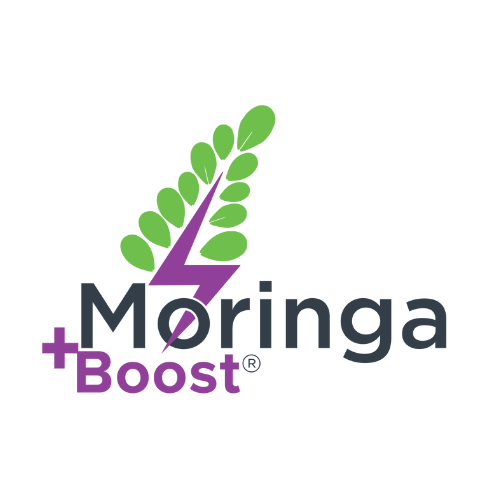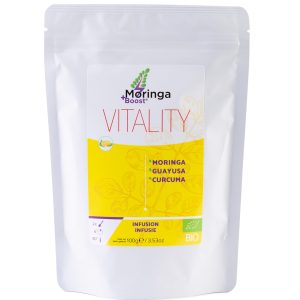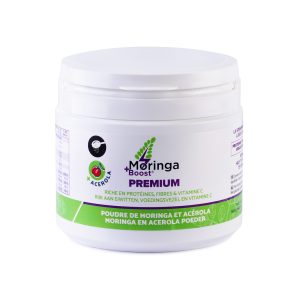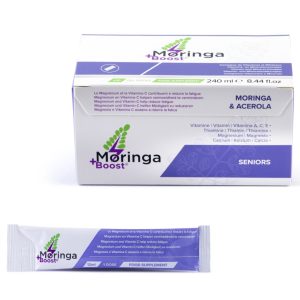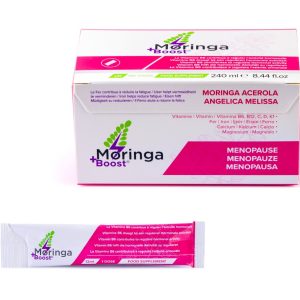Vitamin A is one of the vitamins essential to our health, but it is sometimes underestimated compared to other nutrients. However, its functions in the body are crucial.
In this article, we’ll explore vitamin A in detail, highlighting its benefits, dietary sources and the consequences of a deficiency. By understanding the importance of vitamin A, you can take steps to maintain a balanced diet and ensure your well-being.
● Vitamin A: What is it?
Vitamin A is a fat-soluble vitamin, which means it is soluble in fats. It is essential to many bodily functions, including vision, the immune system, cell growth, reproduction and the functioning of certain organs, such as the heart, lungs and kidneys.
What’s more, it’s a powerful antioxidant that helps fight free radicals, unstable molecules implicated in aging and various diseases.
● Benefits of Vitamin A
Rich in vitamin A, moringa is recognized for combating malnutrition and boosting the body’s natural defenses.
- Vision: Vitamin A is essential for vision, especially night vision. It is a key component of rhodopsin, a pigment present in the rod cells of the retina, which enables us to see in low-light conditions.
- Immune system: Vitamin A plays an essential role in strengthening the immune system, helping to produce the white blood cells that fight infection.
- Growth and Development: Crucial for cell growth, making it particularly important for growing children.
- Organ function: Vitamin A maintains the proper functioning of organs such as the heart, lungs, kidneys and liver.
- Skin health: Promotes healthy skin by contributing to cell regeneration.
The benefits of moringa, rich in nutrients, are supported by scientific studies that confirm its positive impact on health.
● Food sources of Vitamin A
Vitamin A is present in many foods, and there are two forms of vitamin A in the diet:
- Preformed vitamin A (retinol): found in animal products such as liver, eggs and dairy products. Retinol can be used directly by the body.
- Provitamin A (carotenoids): Carotenoids are found in orange and yellow fruits and vegetables, such as carrots, sweet potatoes and mangoes, as well as in spinach and moringa, among others. The body converts these carotenoids into retinol.

● The consequences of vitamin A deficiency
Vitamin A deficiency can lead to a number of health problems. Common symptoms of vitamin A deficiency include:
- Night blindness: Impaired vision in low-light conditions, which can progress to night blindness if the deficiency is left untreated.
- Xerophthalmia: A condition characterized by dry, irritated eyes.
- Keratomalacia: A softening of the eye’s cornea.
- Weakening of the immune system: increased vulnerability to infections, especially in children.
- Growth problems: Children suffering from vitamin A deficiency may experience stunted growth.
- Skin problems: Dry, flaky skin, prone to infection.
● The Importance of Vitamin A for Global Health
Vitamin A deficiency is a major health problem in many parts of the world, particularly in developing countries where access to a balanced diet is limited. Vitamin A supplementation programs have been set up to combat this deficiency, particularly in children, to reduce the risk of blindness and boost the immune system.
Prestigious international organizations such as the International Red Cross and Action contre la Faim encourage moringa plantations to provide populations with the vitamin A and protein they need to survive. Moringa consumption, in powder form, is encouraged in regions where access to a rich and varied diet is limited.
● Tips for maintaining a sufficient intake of Vitamin A
Rich in protein, moringa powder can complement a vegetarian or vegan diet, providing all the essential amino acids. To maintain a sufficient intake of Vitamin A and take advantage of its health benefits, here are a few tips:
- Diversify Your Diet: Include a variety of vitamin A‑rich foods, including green leafy vegetables, carrots, sweet potatoes, apricots, liver, eggs, and dairy products.
- Eat Foods Rich in Carotenoids: Carotenoids are abundant in colorful fruits and vegetables. Incorporating these foods into your diet will provide you with vitamin A in the form of provitamin A.
- Consult a healthcare professional: If you feel you’re not getting enough vitamin A from your diet, talk to a healthcare professional about supplementation.
● Vitamin A in Moringa
Moringa leaf powder is a concentrate of nutrients, notably rich in vitamin A, essential for eye health and the immune system. It contains a complete range of essential amino acids, making it one of the most complete dietary supplements available. Reduced to a powder, moringa retains its nutritional properties and becomes a valuable ally for easy consumption.
Moringa, also known as the “miracle tree”, is an exceptionally nutrient-rich plant. Its leaves, seeds and roots have been used for centuries for their nutritional and medicinal benefits. Moringa is a valuable source of vitamin A in the form of beta-carotene.
The beta-carotene contained in moringa is a natural precursor of vitamin A. A serving of dried moringa leaf powder can provide an impressive amount of beta-carotene, offering a considerable supply of vitamin A. This high concentration of beta-carotene makes moringa one of the best natural sources of vitamin A available.
Moringa seeds, like the moringa leaf, are used for their high vitamin and mineral content.
● Vitamin A from Moringa vs. other sources
Moringa is distinguished by its exceptional concentration of vitamin A compared to many other food sources. Dried leaves contain 1,320 µg/100 g. . This makes it a particularly interesting option for people deficient in Vitamin A.
In comparison, carrots, often considered an emblematic source of beta-carotene, also contain vitamin A, but in smaller quantities than moringa. Moringa’s beta-carotene is more concentrated, which means you get more nutritional benefits in a smaller portion.
● Incorporate Moringa into your diet
It’s relatively easy to incorporate moringa into your diet to take advantage of its vitamin A and other nutrient benefits. Here are a few ideas:
Smoothies
Add 1–2 teaspoons of Moringa & Acerola MoringaBoost PREMIUM powder to your smoothie for a nutritional boost. You’ll add a slightly herbaceous, spicy note to your smoothies and enjoy all the benefits.
Soups
Sprinkle Moringa & Acerola MoringaBoost PREMIUM powder on your soups just before serving to boost their nutrient content.
Pasta, salads and grilled vegetables: Moringa pesto.
Mix 1 teaspoon of Moringa & Acerola MoringaBoost PREMIUM Powder with 2 tablespoons of extra-virgin olive oil, a handful of toasted pine nuts, 1 tablespoon of grated Parmesan, salt and pepper to taste. Blend and gently pour over pasta, tomato-mozzarella, mixed salads or pan-fried greens.
Teas and hot drinks
Why not start the day with a MoringaBoost VITALITY infusion?
Based on Moringa, Guayusa and Curcuma, it has been created to provide the antioxidants and energy needed to spend a comfortable, dynamic day, strengthening the immune system and helping to lower blood sugar levels.
Rich in caffeine, amino acids, vitamins and antioxidants, Guayusa helps improve concentration and boost energy.
What’s more, Turmeric contains powerful antioxidants and offers extraordinary anti-inflammatory properties.
Scented with lemongrass and lemon zest, and sweetened with a light touch of Stevia, a hot mug in the morning and another in the early afternoon will give you the antioxidants and energy you need for the whole day!
Tip: infuse 2 teaspoons of MoringaBoost VITALITY infusion per 250 ml of water at 80° for 6 minutes.
In summer, remember to take it with you to enjoy fresh all day long. MoringaBoost VITALITY infusion is a light, refreshing drink that can be an excellent alternative to tea or coffee.
Energy mixes
Incorporate MoringaBoost PREMIUM Moringa & Acerola Powder into homemade energy mixes with nuts, seeds and dried fruits for a healthy, revitalizing snack that fills you up with plant proteins, antioxidants and Vitamins A and C, among others.
● Conclusion
Vitamin A is an essential nutrient for maintaining good health, with important impacts on vision, the immune system and cellular health. Moringa is an exceptional source of Vitamin A in the form of
beta-carotene, providing a powerful natural solution for maintaining an adequate intake of this essential vitamin. By incorporating moringa into your diet, you can take advantage of its vitamin A benefits and boost your overall health. It’s a valuable nutritional option to explore to promote your long-term well-being. So take care of your health and discover the benefits of this essential vitamin contained in moringa.
● References
- Source of vitamin A : Moringa oleifera is a Prominent Source of Nutrients with Potential Health Benefits — PMC
- Health benefits : Bioactive Components in Moringa Oleifera Leaves Protect against Chronic Disease — PMC
- Scientific studies: Moringa oleifera: A review on nutritive importance and its medicinal application
